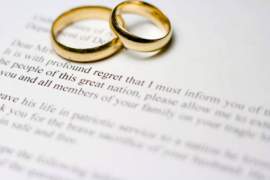
Requirements You Should Know For Marriage

Popular In Marriage
Common Law Marriage Louisiana Common Law Marriage Massachusetts Common Law Marriage Nevada Common Law Marriage Ohio Marriage Certificate Common Law Marriage Kentucky Free Marriage Records Putative Marriage Definition Common Law Marriage Alaska Common Law Marriage Oklahoma Common Law Marriage Mississippi Common Law Marriage New Mexico
Each state has unique marriage license requirements. In general, states have restrictions on gender, age and the ability to make decisions, or mental capacity of both individuals wishing to be granted the marriage license. In addition, many states have waiting periods as one of the requirements for marriage licenses.
Generally, couples must obtain the application for a marriage license after they prove that they meet all of the requirements for marriage licenses. The couple must also be able to prove that neither individual is currently married to someone else. If either spouse has ever been married, they are required to provide proof of divorce, or death certificates if a spouse has passed away. Couples must adhere to state specific requirements to obtain a marriage license.
Each state charges a different fee as part of the requirement for marriage licenses. Those fees generally range from a few dollars, to less than a hundred dollars.That fee is only paid after couples have demonstrated that they meet the age and gender requirements of their state, or the state in which they will be married. In addition, the couple must generally have a witness that is over the age of eighteen, and offers their signature as proof that they witnessed the couple sign the marriage license application.
Couples that have a spouse that has taken part in a divorce, must provide a copy of their final divorce decree as proof of eligibility to again be married. When either spouse is widowed, they must also provide a death certificate as proof that a spouse is deceased. Some states also have marriage license requirements that include blood tests in order to rule out certain diseases. Originally the intent of the practice, was to avoid couples passing on sexually transmitted diseases.
However, many states have stopped blood testing as one of the requirements for marriage licenses because it was seen as an invasion of privacy. Couples are expected to disclose that information without intervention form their state's government. Marriage license requirements have begun to change in order to assign some individual responsibility for disclosure, to individuals wishing to marry.
Requirements for marriage licenses are generally rather simple and straight forward. Although marriage license requirements vary from state to state, there are pretty standard requirements. There are general marriage license requirements that include proof of eligibility to marry according the state's marriage laws.
Generally that proof must include birth date confirmation in order to assure that both individuals are of the legal age to enter into marriage. In addition, states that forbid same sex marriage, will not grant a license to couples that are not of the opposite sex. Also, any couple that does not appear to be mental or emotionally capable of entering into the marriage contract, will not likely be granted a marriage license. Couples are generally able to obtain a marriage license when they have proof that they meet their state's specific requirements.



















